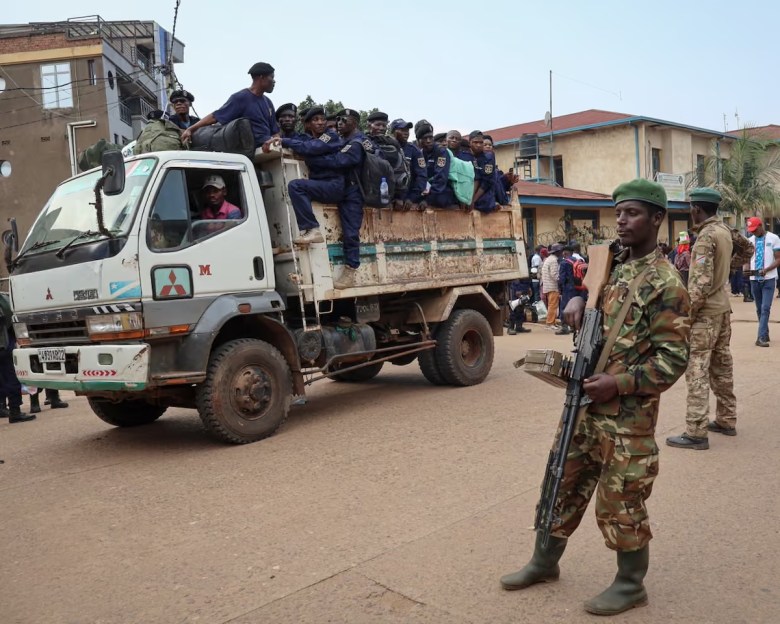Politics
US-Brokered Peace Deal Ties DRC’s Resources to Security Aid

A recent peace agreement facilitated by the United States between the Democratic Republic of Congo (DRC) and Rwanda has raised concerns over the implications of linking mineral resources to security guarantees. Signed in June 2025, this deal aims to resolve decades of conflict between the two nations while establishing a framework for regional economic integration. Under the agreement, both countries commit to developing “transparent, formalized end-to-end mineral chains” that would enhance collaboration among them, the US government, and American investors.
Despite the DRC’s significant mineral wealth, it remains one of the five poorest countries globally, with a pressing need for foreign investment in its mineral sector. The US has proposed a potential multi-billion-dollar investment program intended to anchor its mineral supply chains within the DRC. This arrangement raises questions about the long-term benefits for the DRC, as it appears to tie its resource wealth to US military oversight in exchange for vague security assurances.
Historical Context and Security Concerns
The relationship between the DRC and Rwanda has been fraught with tension since the violent conflicts known as the First (1996-1997) and Second (1998-2003) Congo wars. Control over the DRC’s mineral resources has been a central issue, leading to exploitation and armed conflict. The latest peace deal introduces a resources-for-security model, reminiscent of strategies previously employed by China and Russia in countries like Angola and the Central African Republic.
Critics argue that such arrangements often benefit foreign powers more than the host nation. The DRC is rich in critical minerals such as cobalt, copper, and lithium, essential for modern technologies, yet its government struggles to exert control over its vast territory of 2.3 million square kilometers and a population of 109 million. Reports indicate that neighboring countries, particularly Rwanda and Uganda, have been implicated in the illegal extraction of minerals in the DRC, exacerbating the ongoing conflict.
The US-backed peace agreement also establishes a joint oversight committee, which includes representatives from the African Union and Qatar, aimed at addressing grievances between the DRC and Rwanda. However, the committee lacks clear mechanisms to ensure accountability or enforce security commitments from the US, raising doubts about its effectiveness.
The Risks of Resource-for-Security Deals
While resources-for-security agreements may offer immediate benefits such as financing and stability, they often come at a long-term cost to national sovereignty. Contracts may include clauses that freeze future regulatory reforms, limit legislative autonomy, and bind nations to unfavorable pricing structures. Disputes arising from these agreements often end up in international arbitration, bypassing local legal systems and diminishing national control over resources.
The experience of other African nations serves as a cautionary tale. For instance, Angola’s US$2 billion loan from China Eximbank in 2004, which was secured by future oil revenues, effectively stripped Angolan authorities of decision-making power over their own resources. Such arrangements can lead to a lack of accountability, as they often span multiple government ministries, making it difficult to monitor and regulate effectively.
The DRC’s situation exemplifies these challenges. With its security forces weakened by limited resources and corruption, the appeal of US military support is evident. Yet, the potential for repeating the mistakes of past agreements looms large, especially if they lead to entrenched extractive practices that harm local communities.
The DRC is at a crossroads. As global demand for critical minerals continues to rise, African nations must leverage their resources strategically. This entails strengthening institutional frameworks and legal capacities to negotiate equitable deals that prioritize local benefits and safeguard human rights. The future of the DRC should not hinge solely on foreign security guarantees but on a sustainable and transparent management of its abundant resources.
In conclusion, the DRC’s engagement in this US-brokered deal reflects a complex interplay of historical grievances, economic needs, and geopolitical interests. The challenge lies in ensuring that this agreement leads to genuine benefits for the Congolese people rather than reinforcing patterns of exploitation and loss of sovereignty. As experts like Hanri Mostert and Tracy-Lynn Field highlight, the DRC must navigate these waters carefully to protect its future.
-

 World5 months ago
World5 months agoSouth Korea’s Foreign Minister Cho Hyun to Visit China This Week
-

 Business5 months ago
Business5 months agoStarling Bank Plans Secondary Share Sale, Targeting $5.4 Billion Valuation
-

 Top Stories5 months ago
Top Stories5 months agoMunsang College Celebrates 100 Years with Grand Ceremony
-

 World5 months ago
World5 months agoPAS Aims to Expand Parliamentary Influence in Upcoming Election
-

 Business7 months ago
Business7 months agoKenvue Dismisses CEO Thibaut Mongon as Strategic Review Advances
-

 Lifestyle6 months ago
Lifestyle6 months agoHumanism Camp Engages 250 Youths in Summer Fest 2025
-

 Sports6 months ago
Sports6 months agoDe Minaur Triumphs at Washington Open After Thrilling Comeback
-

 Sports7 months ago
Sports7 months agoTupou and Daugunu Join First Nations Squad for Lions Clash
-

 Top Stories7 months ago
Top Stories7 months agoColombian Senator Miguel Uribe Shows Signs of Recovery After Attack
-

 World7 months ago
World7 months agoASEAN Gears Up for Historic Joint Meeting of Foreign and Economic Ministers
-

 Health6 months ago
Health6 months agoNew Study Challenges Assumptions About Aging and Inflammation
-

 Business7 months ago
Business7 months agoOil Prices Surge Following New EU Sanctions on Russia









